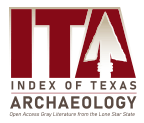Home > Research Projects and Centers > Center for Regional Heritage Research > Index of Texas Archaeology > Vol.
Article Title
Final Report A Phase I Cultural Resources Survey of the Break Point Project Fort Bend County, Texas
Agency
Texas Historical Commission
Abstract
Perennial Environmental Services, LLC (Perennial), on behalf of Gulf South Pipeline Company, LP (Gulf South), a subsidiary of Boardwalk Pipeline Partners, LP (Boardwalk), conducted an intensive cultural resources survey of the proposed Break Point Project (Project) located in Rosenberg in Fort Bend County, Texas. The Project will involve the hydrostatic testing of the existing line. The hydrostatic test will require temporary workspace in order to complete the proposed activities.
The proposed Project construction will include the excavation of the existing pipeline and in order to complete a hydrostatic test of the line. Temporary workspace within the defined Project area will be utilized for construction vehicular traffic and equipment storage during the testing activities. Ground disturbance will be minimal outside of the existing corridor; however, limited excavation activities will be necessary at the margins of the existing right of way (ROW).
The proposed Project may require the usage of a Nationwide Permit (NWP) issued by the US Army Corps of Engineers (USACE). As such, portions of the Project fall under the jurisdiction of the USACE. Additionally, the proposed Project is regulated by the Federal Energy Regulatory Commission (FERC). Cultural resources surveys were conducted for the approximately 3.4-acre Project area in accordance with Section 106 of the National Historic Preservation Act (NHPA). The survey was designed to inventory and assess cultural resources across the Project. These efforts involved both surface and subsurface archaeological survey.
The area of potential effect (APE) is considered the entirety of the Project area. The APE measures approximately 3.4 acres with depths of impact extending to the depth of the existing pipeline (4.0 to 6.0 ft [1.2 to 1.8 m]) within the permanent easement, and 0.6 to 1.0 ft (0.1 to 0.3 m) within the temporary workspace areas. Perennial conducted the intensive Phase I archaeological investigation within the boundaries of the Project. Abby Peyton served as the Principal Investigator (PI) for the Project and Zachary Overfield, Michael Maddox, and Miles Martin conducted the fieldwork on January 22, 2016.
The survey investigations resulted in entirely negative findings with no cultural resources observed along the ground surface or within any of the ten shovel tests excavated across the Project. Overall, the Project area was found to be covered by bermudagrass and small stands of hardwoods and scrub brush. The typical shovel test profiled consisted of a dark grayish brown sandy loam from (0-11.8 in [0-30 cmbs]) on top of a gray clay (11.8-39.4 [30-100 cmbs]). Based on the negative survey results recorded during the investigation, it is the professional opinion of the Principal Investigator that the Project will have no adverse effect on significant cultural resources listed on or considered eligible for listing on the NRHP. No further work is recommended for the Project.
Creative Commons License

This work is licensed under a Creative Commons Attribution-NonCommercial 4.0 International License
Included in
American Material Culture Commons, Archaeological Anthropology Commons, Environmental Studies Commons, Other American Studies Commons, Other Arts and Humanities Commons, Other History of Art, Architecture, and Archaeology Commons, United States History Commons
Submission Location
Tell us how this article helped you.


